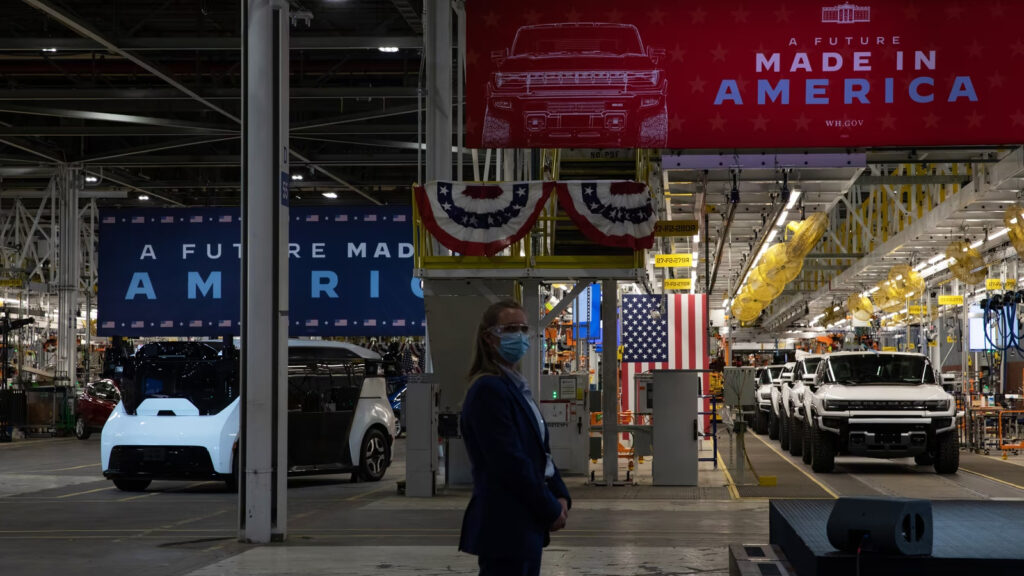Original publication by Emma Marris for theatlantic.com on 8 February 2023
Just how far can this climate momentum take us?

It is a good time to be in the decarbonization business in the United States. The Inflation Reduction Act—with its $374 billion cornucopia of green incentives, subsidies, and grants—was designed to entice private companies to invest in the transition away from fossil fuels. Initial reports already suggest that the IRA may be working. An analysis by American Clean Power, a lobbying group of renewable-energy companies, indicates that even just the anticipation of its bounty catalyzed $40 billion in investments and created nearly 7,000 jobs in the last few months of 2022.
Things are so rosy for the green industry in the United States, in fact, that the European Union feels left out. It is miffed that many of the IRA’s tax breaks and subsidies apply only to American-made products, tempting European companies to open operations here. And so now the EU has its own take on the Inflation Reduction Act: Last week, the European Commission proposed a “Green Deal Industrial Plan.” It includes $240 billion in loans and $21 billion in grants from EU coffers to subsidize green businesses, a relaxation of state-aid rules to allow member countries to offer subsidies, job training, faster permitting for “clean technology” projects, and measures to ensure access to “critical raw materials,” such as the lithium used in many electric-vehicle batteries. This week, economy ministers from Germany and France are in Washington, D.C., hoping to persuade the U.S. to allow EU-made electric cars and batteries to qualify for subsidies.
All of this squabbling suggests that many world leaders now see the energy transition as not only inevitable but lucrative—a source of prosperity and jobs. This “race to the top” approach to tackling climate change is new, according to Jessie Jenkins, an energy-policy researcher at Princeton. “For decades, the climate challenge has been framed as a collective-action problem,” he told me, “a tragedy of the commons that demanded shared sacrifice.” Now, instead of requiring sacrifice, fixing the climate is seen as having “significant economic, security, and geostrategic benefits.” Global investment in decarbonization surpassed $1 trillion in 2022—on par, for the first time, with investments in fossil fuels. For longtime observers of international climate policy, the shift feels seismic. Watching countries jockey for position in industries that were once considered niche sideshows is “thrilling,” Alice Hill, a senior fellow at the Council on Foreign Relations, told me.
The IRA itself was in large part a response to China’s global dominance in many green industries. With the EU in the mix, the three largest economies in the world are all trying to ride this wave. So is this it? Has decarbonization finally gone mainstream and picked up enough momentum that it will inevitably barrel along until the fossil-fuel industry is dead and buried? Can we all stop worrying now?
Well, no.
Around the world, there is lots of new enthusiasm for green industries, but “it’s not clear that all these technologies will take root with sufficient speed and sufficient spread to keep us safe,” Hill said. Keeping the global annual-temperature rise under 2.7 degrees Fahrenheit (1.5 degrees Celsius), the stretch goal in the Paris agreement, is all but impossible at this point. And even the backup goal of 3.6 degrees Fahrenheit (2 degrees Celsius) is going to require a Herculean level of hustle.
Emissions reductions will be constrained by how quickly we can build new wind turbines and batteries and high-voltage power lines, which are especially necessary for the push to “electrify everything.” Jenkins’s lab at Princeton has calculated that to reap all the emissions reductions that the IRA promises, the U.S. must more than double its current rate of electricity-grid expansion.
But there’s also an economic issue to contend with: Many companies that see opportunities in the coming green rush are also happy to keep making money off of fossil fuels. Global demand for energy is expected to continue growing, and at the moment oil and gas prices are temptingly high. None other than the oil behemoth ExxonMobil told investors last week that it is angling to become “a leader in the energy transition,” getting into businesses such as carbon capture and storage—but the company has no plans to wind down its operations that emit carbon in the first place.
Policies such as the IRA and the Green Deal Industrial Plan are incomplete on their own, says Nico Bauer, an economist who models policy-climate interactions at the Potsdam Institute for Climate Impact Research, in Germany. Thinking that you can “drive out the fossil fuels by flooding the markets with clean energy” is “naive,” he told me. “You have to cut emissions.” For example, the IRA’s subsidies for electric vehicles will cut emissions, but plenty of people will still buy a gasoline-powered car and forgo the subsidy. Regulations exist, but they are patchy. The EU charges a fee to emit carbon, but the fee is low and applies only to some industries. The U.S. sets emission standards for vehicles, but its attempts to regulate greenhouse-gas emissions from power plants and most other “stationary sources” have been stymied by legal challenges.
Piecemeal policies targeting emissions in particular sectors or from particular sources can help, but they can also tend to move emissions around. Squeeze the carbon balloon on one end, and it’ll bulge on the other. Case in point: Bauer and colleagues just published a new analysis finding that even as countries pledge to phase out coal use for electricity generation, coal companies can simply pivot to selling coal to the steel, cement, and chemicals industries, which will be happy to power their industrial processes with the dirty black stuff as its price falls. Bauer told me that his favorite solution is to regulate the whole balloon with a comprehensive tax on carbon emissions, although he admits that isn’t politically popular at the moment.
Indeed, in the U.S. Joe Biden didn’t even try to pass a carbon tax and instead focused on incentives because they were more politically popular. “They went with carrots rather than sticks,” Hill said. “But sticks should eventually be part of the solution.” (Interestingly, there is one stick tucked in the IRA: a fee for emitting the powerful greenhouse gas methane, which applies only to large oil and gas facilities with significant emissions. According to the Congressional Research Service, “This charge is the first time the federal government has directly imposed a charge, fee, or tax on [greenhouse-gas] emissions.”)
Even without sticks, the carrots in the IRA will do a lot to reduce U.S. emissions. And the global green rush that the bill seems to have kicked off is shifting both the global economy and the global conversation about climate. Decarbonization is no longer framed as the enemy of economic growth. Instead, it is seen as an engine of economic growth. The “green economy” is becoming just “the economy.”
But for some in the climate movement who are generally skeptical of capitalism, watching the global economy go all in on the energy transition feels deeply unsettling. These advocates are concerned that the mad scramble for decarbonization profits could create its own human-rights and environmental crises. For example, as documented in the new book Cobalt Red, by Siddharth Kara, a significant fraction of the cobalt in the world’s EVs is wrested from the earth by desperately poor miners in the Democratic Republic of Congo who breathe in toxic cobalt dust all day.
Activists who have spent years trying to convince people in power that things need to change suddenly find themselves thrust into a new role: that of watchdogs, as those same people in power dive headlong into changing everything. The goal is no longer to convince the world that climate change is real; it is to push for a “just transition” that will keep leaders focused on outcomes such as human-rights and ecosystem protection instead of merely dollars, euros, and yuan. The transition ahead can play out in many ways, and there will be much work to do. But in terms of raw global emissions, it is just possible that what could not be accomplished by appeals to future generations, dying polar bears, or the world’s poorest people will be achieved through FOMO.




